During his Wednesday General Audience in St. Peter’s Square, Pope Francis took a break from his usual catechesis series to speak about the treatment of migrants seeking refuge abroad. He emphasized that allowing migrants to die in extreme conditions is a “grave sin” and called for more humane methods for vetting and organizing migrants. The pontiff condemned those who work to push back migrants instead of helping them, stating that it is a conscious and responsible sin. Pope Francis urged the audience to pray for migrants and emphasized the importance of contributing to their well-being in any way possible.
The Catholic Church teaches that governments have two obligations when dealing with immigration and refugees. The first duty is to welcome the foreigner out of charity and respect for the human person, as outlined in the Catechism of the Catholic Church. The second duty is to secure borders and enforce the law for the sake of the common good. The Church acknowledges that nations have the right to enforce their laws while also emphasizing that human beings have the right to immigrate. Pope Francis reiterated the importance of balancing these obligations to create a compassionate and just approach to dealing with migrants.
Pope Francis called on individuals to consider how they can contribute to helping migrants and refugees, highlighting the power of prayer in supporting those in need. He reminded the audience that God is present in the struggles of migrants, suffering and hoping alongside them. The pontiff emphasized the importance of not turning a blind eye to the plight of migrants and urged people to act with compassion and empathy towards those seeking safety and refuge. Pope Francis’s words serve as a reminder of the moral imperative to offer aid and support to those in need, regardless of their background or nationality.
The pontiff also addressed the issue of drug trafficking, labeling traffickers as “murderers” and describing the liberalization of drug laws as a “fantasy.” Pope Francis spoke out against the exploitation of vulnerable individuals by drug traffickers and called for greater efforts to combat the drug trade. The pope’s strong stance on drug trafficking reflects his commitment to justice and human rights, as he condemns those who profit from the suffering of others. By raising awareness of the damaging effects of drug trafficking, Pope Francis calls for a collective effort to address this global issue and protect those who are most vulnerable.
In addition to speaking out on the treatment of migrants and drug trafficking, Pope Francis also warned of the potential risks posed by artificial intelligence in his first-ever G-7 papal address. He emphasized the need for safeguards to ensure that AI remains under “proper human control” and does not infringe on human dignity or rights. The pope’s address reflects his concern for the ethical implications of technological advancements and his commitment to upholding the values of justice, compassion, and respect for human life. By highlighting the importance of responsible AI development, Pope Francis encourages a thoughtful and ethical approach to technological innovation in order to protect the well-being of individuals and society as a whole.
Overall, Pope Francis’s messages on migration, drug trafficking, and artificial intelligence emphasize the need for ethical and compassionate responses to complex global challenges. The pontiff calls on individuals, governments, and institutions to consider the moral implications of their actions and to work towards creating a more just and equitable world. By advocating for the rights and dignity of migrants, condemning drug traffickers, and calling for responsible AI development, Pope Francis embodies the principles of justice, compassion, and respect for all human life. His words serve as a reminder of the importance of responding to social and moral issues with empathy and solidarity, and his teachings encourage a thoughtful and ethical approach to addressing the pressing challenges of our time.


